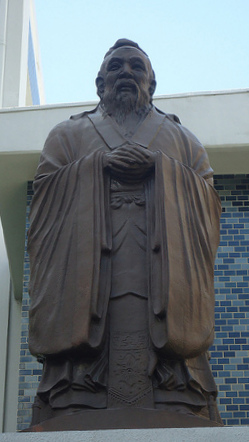Difference between revisions of "Confucius"
(Created page with "right|thumb|249px|Statue of Confucius on the former site of the [[Shiseibyo|Confucian temple in Kumemura, Naha, [[Okinawa prefecture|Okinaw...") |
(No difference)
|
Revision as of 19:49, 16 December 2013
- Born: 552 BCE
- Died: 479 BCE
- Chinese/Japanese: 孔子 (Kǒng Zǐ / Koushi)
Kǒng Zǐ (lit. "Master Kǒng"), commonly known in English as Confucius, was a philosopher of ancient China. His teachings, collected into the Analects of Confucius, along with the various forms of Confucianism and Neo-Confucianism they have inspired, have historically formed the core of political philosophy and moral education throughout East Asia.
Originally from Qufu in what is today Shandong province, Confucius is said to have pursued a career as a statesman, ultimately resigning when he found the task conflicted with his personal beliefs. He then traveled widely, accumulating followers and disciples, who after his death assembled his teachings into the Analects.
Confucianism was made the official state philosophy of the Han Dynasty in 139 BCE, and in the centuries which followed, a number of Confucian temples were built. Emperor Taizong of Tang (r. 626-649) later ordered that temples to Confucius be constructed in every major city in the empire.
References
- Pamphlet available at Kume Confucian temple, Matsuyama Park, Naha, Okinawa, published by Kume Sôseikai.
